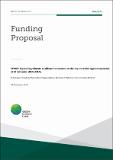Mostrar el registro sencillo del ítem
Mejora de las medidas de resiliencia climática en los agroecosistemas del corredor seco de El Salvador (RECLIMA)
| dc.contributor.author | FAO | |
| dc.date.accessioned | 2019-05-23T23:34:10Z | |
| dc.date.available | 2019-05-23T23:34:10Z | |
| dc.date.issued | 2018-02 | |
| dc.identifier.citation | FAO (2018), Mejora de las medidas de resiliencia climática en los agroecosistemas del corredor seco de El Salvador (RECLIMA). | en_US |
| dc.identifier.uri | http://rcc.marn.gob.sv/xmlui/handle/123456789/350 | |
| dc.description.abstract | El Salvador, which is located in the dry corridor of Central America, is one of the most vulnerable countries to climate risks in the world. Projected increases in the variability of rainfall, temperature, and the occurrence of extreme rainfall events threaten the food and water security and livelihoods of family farmers living on heavily deforested and degraded hilly lands. Projections for Central America estimate reductions in water availability of between 35% and 63%; El Salvador will be the country most affected. The Intergovernmental Panel on Climate Change predicts that rising emperatures will reduce the country’s yields of main crops by 30% by 2050, mainly through recurrent drought. Crop simulation models predict that sorghum and maize yields could decrease by up to 20% and dry beans yields could decrease by 50% by 2065, 1 with direct implications on food security, especially in the dry corridor of the country. | en_US |
| dc.language.iso | en | en_US |
| dc.rights | Attribution-NonCommercial-ShareAlike 3.0 | |
| dc.subject | Cambio Climático | en_US |
| dc.title | Mejora de las medidas de resiliencia climática en los agroecosistemas del corredor seco de El Salvador (RECLIMA) | en_US |
| dc.type | Technical report | en_US |

